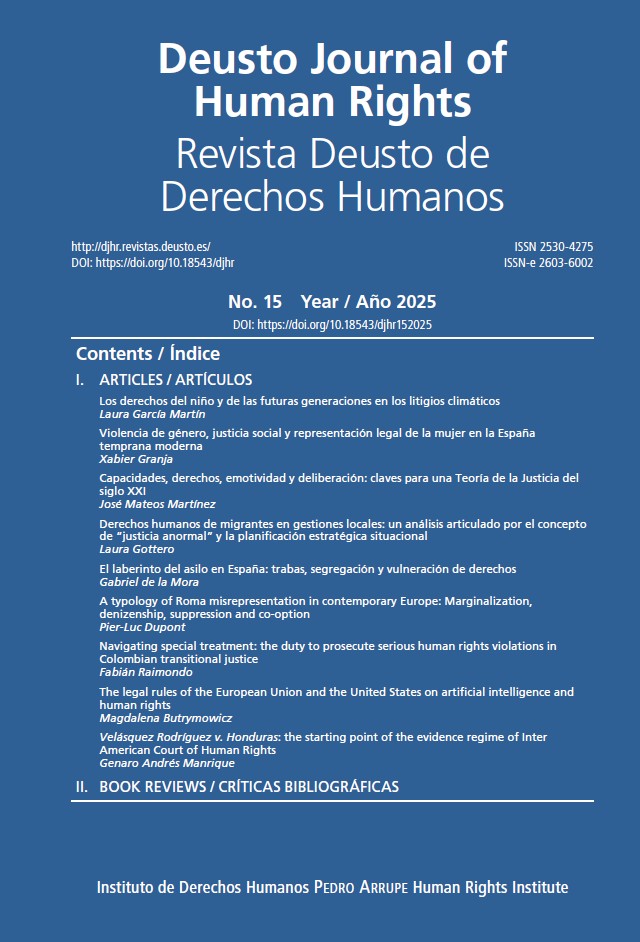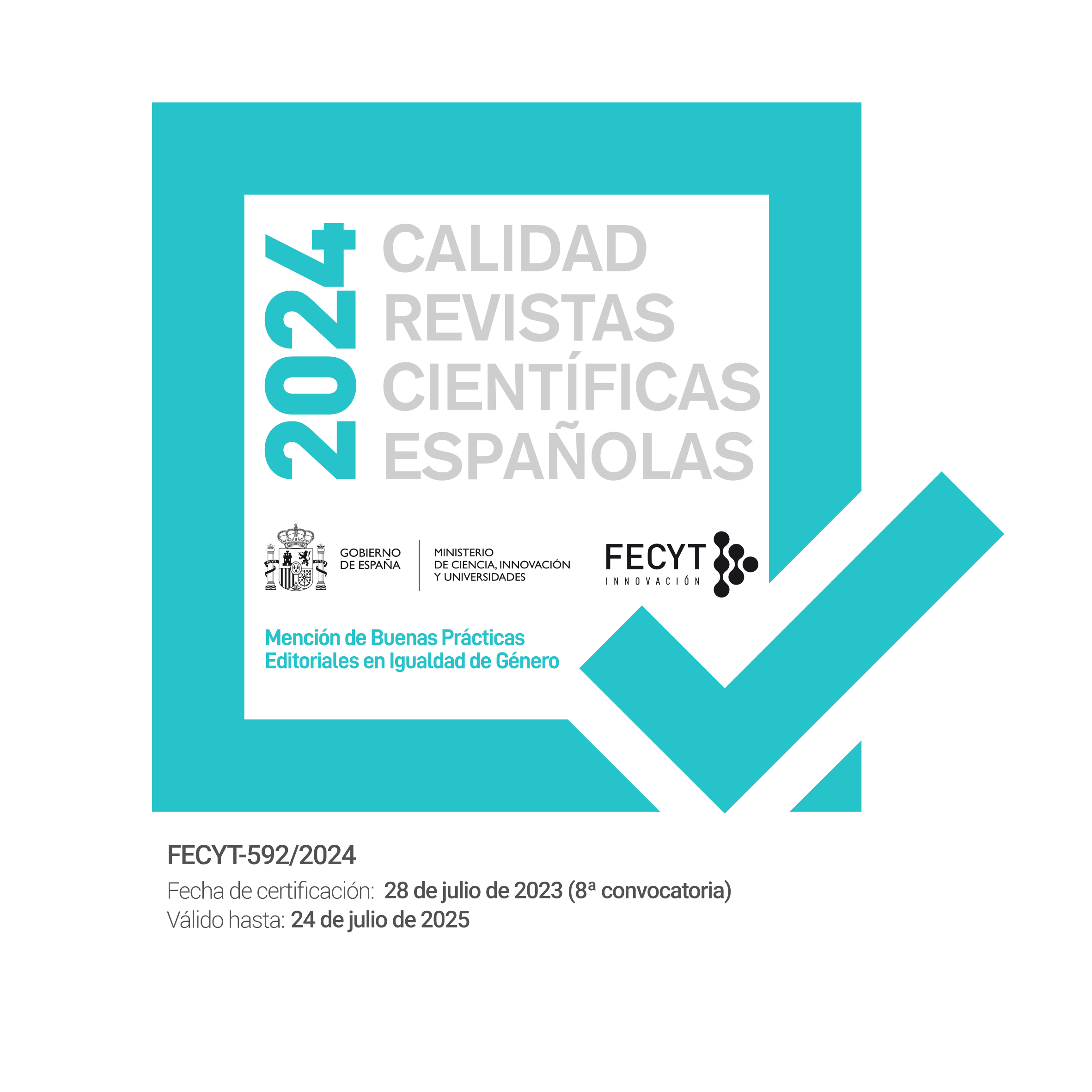Formas de dominación de las personas romaníes en la Europa contemporánea: Marginación, extranjerización, supresión y cooptación
Resumen
Partiendo de la teoría del estado racial desarrollada por David Theo Golberg y de estudios empíricos sobre las personas romaníes en Europa, este artículo analiza diferentes formas en que el racismo puede socavar la representación política. Con este fin, recurre a los conceptos de «dominación ordinaria » y « desencuadre » de Nancy Fraser; a la idea de que las personas « afectas por » o « sujetas a » las políticas públicas deberían participar en su desarrollo; y a las cuatro formas de representación (formal, sustantiva, descriptiva y simbólica) identificadas por Hannah Pitkin. El artículo distingue formas de dominación arraigadas en la discriminación cotidiana y la exclusión educativa (marginación), la negación de la ciudadanía (extranjerización), el rechazo de ciertas identidades culturales (supresión) y la neutralización de los líderes étnicos (cooptación). Sostiene que la marginación constituye una forma de desigualdad política « ordinaria » entre ciudadanos, mientras que la extranjerización, supresión y cooptación infringen el principio de las « personas afectadas/sujetas » mediante la identificación errónea de aquellos con derecho a participar en determinadas decisiones políticas.
Recibido: 22 febrero 2025
Aceptado: 09 junio 2025
Descargas
Citas
Akkan, Basak. 2018. Roma and representative justice in Turkey. ETHOS working paper 5.2. Accessed June 16, 2005: https://bpb-eu-w2.wpmucdn.com/blogs.bristol.ac.uk/dist/e/505/files/2025/06/5.2Turkey.pdf.
Anderson, Bridget and Pier-Luc Dupont. 2018. How does it feel to be a problem? What we can learn about justice as political representation from empirical case studies. ETHOS report 5.2. Accessed June 16, 2005: https://bpb-eu-w2.wpmucdn.com/blogs.bristol.ac.uk/dist/e/505/files/2025/06/5.2.-Justice-as-political-representation.pdf.
Anderson, Bridget, Dora-Olivia Vicol, Pier-Luc Dupont and Julia Morris. 2018. Political representation and experienced recognition among Roma in the UK. ETHOS working paper 5.2. Accessed June 16, 2005: https://bpb-eu-w2.wpmucdn.com/blogs.bristol.ac.uk/dist/e/505/files/2025/06/5.2UK.pdf.
Anderson, Bridget. 2013. Us and them? The dangerous politics of immigration controls. Oxford: Oxford University Press.
Araújo, Sara and Laura Brito. 2018. Tensions between institutionalized political justice and experienced (mis)recognition: Portuguese case study on the experiences of Roma communities. ETHOS working paper 5.2. Accessed June 16, 2005: https://bpb-eu-w2.wpmucdn.com/blogs.bristol.ac.uk/dist/e/505/files/2025/06/5.2Portugal.pdf.
Arrighi, Jean T., Rainer Bauböck, Derek Hutcheson, Alina Ostling and Lorenzo Piccoli. 2019. Conditions for Electoral Rights 2019. European University Institute. Accessed June 16, 2005: https://globalcit.eu/conditions-for-electoral-rights/.
Baclija, Irena, Marjan Brezovsek and Miro Hacek. 2008. «Positive discrimination of the Roma minority: The case of Roma local councillors in Slovenia.» Ethnicities 8(2): 227-250.
Bauböck, Rainer, Joseph H. Carens, Sean W.D. Gray, Jennifer C. Rubenstein and Melissa Williams. 2019. «Democratic inclusion beyond the state?» Contemporary Political Theory 18: 88–114.
Bosniak, Linda. 2006. The citizen and the alien: Dilemmas of contemporary membership. Princeton: Princeton University Press.
Burton, Andrew. 2007. «Minority self-governance: Minority representation in flux for the Hungarian Roma», Ethnopolitics 6(1): 67-88.
Caglar, Ayse. 2016. «Displacement of European citizen Roma in Berlin: Acts of citizenship and sites of contentious politics.» Citizenship Studies 20(5): 647–663.
Clough, Isabella and Ulderico Daniele. 2014. «A failed Roma revolution: Conflict, fragmentation and status quo maintenance in Rome.» Ethnicities 14(6): 775–792.
Clough, Isabella and Ulderico Daniele. 2011. «Roma and humanitarianism in the Eternal City», Journal of Modern Italian Studies 16(5): 621-636.
Csepeli, György and Dávid Simon. 2004. «Construction of Roma identity in Eastern and Central Europe: Perception and self-identification», Journal of Ethnic and Migration Studies 30(1): 129–150.
De Genova, Nicholas. 2016. «The ‘European’ question: Migration, race, and post-coloniality in ‘Europe’», in An anthology of migration and social transformation: European perspectives, ed. Anna A., Kenneth Horvath and Bruno Meeus, 343–356. Cham: Springer.
Dupont, Pier-Luc. 2025. Anti-racism, multiculturalism and human rights: Reconceiving the politics of diversity in employment and education. Cham: Palgrave.
European Union Agency for Fundamental Rights. 2018. A persisting concern: Anti-Gypsyism as a barrier to Roma inclusion. Publications Office of the European Union. Accessed June 16, 2005: https://fra.europa.eu/sites/default/files/fra_uploads/fra-2018-anti-gypsyism-barrier-roma-inclusion_en.pdf.
Faure-Atger, Anaïs. 2013. «European citizenship revealed: Sites, actors and Roma access to justice in the EU», in Enacting European citizenship, edited by Engin Isin and Michael Saward, 178-194. Cambridge: Cambridge University Press.
Fekete, Liz. 2014. «Europe against the Roma.» Race and Class 55(3): 60-70.
Feldman, David. 2012. «Conservative pluralism and the politics of multiculturalism», in Secularism, Racism and the Politics of Belonging, edited by Nira Yuval-Davis and Philip Marfleet, 10-12. London: Runnymede.
Fox, Jon E., Laura Morosanu and Eszter Szilassy. 2012. «The racialization of the new European migration to the UK.» Sociology 46(4): 680–695.
Fraser, Nancy. 2009. Scales of justice: Reimagining political space in a globalizing world. New York: Columbia University Press.
Fraser, Nancy. 2000. «Rethinking recognition.» New Left Review 3: 107–120.
Fraser, Nancy. 1995. «From redistribution to recognition? Dilemmas of justice in a ‘post-socialist’ age.» New Left Review I/212: 68–93.
Fredman, Sandra. 2016. «Substantive equality revisited.» International Journal of Constitutional Law 14(3): 712-738.
Fredman, Sandra. 2008. Human rights transformed: Positive rights and positive duties. Oxford: Oxford University Press.
Garner, Steve. 2016. A moral economy of whiteness: Four frames of racialising discourse. Abingdon: Routledge.
Gay y Blasco, Paloma. 2002. «Gypsy/Roma diasporas. A comparative perspective.» Social Anthropology 10(2): 173–188.
Goldberg, David T. 2006. «Racial Europeanization.» Ethnic and Racial Studies 29(2): 331-364.
Goldberg, David T. 2002. The racial state. Oxford: Blackwell.
Goodin, Robert. 2007. «Enfranchising all affected interests, and its alternatives.» Philosophy and Public Affairs 35(1): 40–68.
Grill, Jan. 2018. «‘In England, they don’t call you black!’ Migrating racialisations and the production of Roma differences across Europe.» Journal of Ethnic and Migration Studies 44(7): 1136–1155.
Gutmann, Amy. 1999. Democratic Education. Princeton: Princeton University Press.
Hammar, Tomas. 1990. Democracy and the nation state: Aliens, denizens and citizens in a world of international migration. Aldershot: Avebury.
Hepworth, Kate. 2014. «Encounters with the clandestine/a and the nomad: The emplaced and embodied constitution of non-citizenship.» Citizenship Studies 18(1): 1–14.
Hepworth, Kate. 2012. «Abject citizens: Italian ‘Nomad Emergencies’ and the deportability of Romanian Roma.» Citizenship Studies 16(3–4): 431-449.
Hiah, Jing and Trudie Knijn. 2018. Country report on the current and historical minoritization of Roma minorities in the Netherlands. ETHOS working paper 5.2. Accessed June 16, 2025: https://bpb-eu-w2.wpmucdn.com/blogs.bristol.ac.uk/dist/e/505/files/2025/06/5.2Netherlands.pdf.
Humphris, Rachel. 2019. «Mutating faces of the state? Austerity, migration and faith-based volunteers in a UK downscaled urban context.» The Sociological Review 67(1): 95-110.
Humphris, Rachel. 2018. «On the threshold: Becoming Romanian Roma, everyday racism and residency rights in transition.» Social Identities 24(4): 505–519.
Ignatoiu-Sora, Emanuela. 2011. «The discrimination discourse in relation to the Roma: Its limits and benefits.» Ethnic and Racial Studies 34(10): 1697– 1714.
Jeffers, Kristen, Iseult Honohan and Rainer Bauböck. 2017. How to measure the purposes of citizenship laws: Explanatory report for the CITLAW indicators. European University Institute. Accessed June 16, 2025: https://globalcit.eu/wp-content/uploads/2018/02/CITLAW_3.0.pdf.
Kaneva, Nadia and Delia Popescu. 2014. «‘We are Romanian, not Roma’: Nation branding and postsocialist discourses of alterity.» Communication, Culture and Critique 7: 511–512.
Khanna, Vandita. 2024. «Roma vulnerability before the European Court of Human Rights: Towards a structural account.» Netherlands Quarterly of Human Rights 42(4): 340-362.
Kóczé, Angéla. 2018. «Race, migration and neoliberalism: Distorted notions of Romani migration in European public discourses.» Social Identities 24(4): 459-473.
Kóczé, Angéla and Márton Rövid. 2012. «Pro-Roma global civil society: Acting for, with or instead of Roma?», in Global civil society 2012: Ten years of critical reflection, edited by Mary Kaldor, Henrietta L. Moore and Sabine Selchow, 110–123. Basingstoke: Palgrave Macmillan.
Kostka, Joanna. 2019. «The migrating poor: Romanian Roma under social authoritarianism in Poland», in Constructing Roma migrants: European narratives and local governance, edited by Tina Magazzini and Stefano Piemontese, 155-174. Cham: Springer.
Kovai, Cecília. 2012. «Hidden potentials in ‘naming the Gypsy’: The transformation of the Gypsy-Hungarian distinction», in The Gypsy ‘Menace’: Populism and the new anti-Gypsy politics, edited by Michael Stewart, 281–294. London: Hurst and Company.
Krizsán, Andrea. 2012. «Group self-determination, individual rights, or social inclusion? Competing frames for ethnic counting in Hungary.» Ethnic and Racial Studies 35(8): 1392-1408.
Kymlicka, Will. 2000. «Nation-building and minority rights: Comparing West and East.» Journal of Ethnic and Migration Studies 26(2): 183-212.
Kymlicka, Will. 1995. Multicultural citizenship: A liberal theory of minority rights. Oxford: Clarendon Press.
Laparra, Miguel and Almudena Macías. 2009. «Spanish Gitanos, Romani migrants and European Roma identity: (Re)unification or self-affirmation?» in Romani politics in contemporary Europe: Poverty, ethnic mobilization, and the neoliberal order, edited by Nando Sigona and Nidhi Trehan, 226– 245. Basingstoke: Palgrave Macmillan.
Leahy, Sharon. 2014. «Demonising discourse: The Traveller Community’s struggle against the elite voice of RTE.» Romani Studies 24(2): 165–201.
Leggio, Daniele Viktor. 2019. «‘Modern-day Fagins’, ‘gaudy mansions’ and ‘increasing numbers’: Narratives on Roma migrants in the build-up to the British EU referendum», in Constructing Roma migrants: European narratives and local governance, edited by Tina Magazzini and Stefano Piemontese, 69-90. City: Springer.
Magazzini, Tina. 2016. «Cultural institutions as a combat sport. Reflections on the European Roma Institute.» The Age of Human Rights Journal 7: 50-76.
Margalit, Gilad and Yaron Matras. 2007. «Gypsies in Germany – German Gypsies? Identity and politics of Sinti and Roma in Germany” in The Roma: A minority in Europe. Historical, political and social perspectives, edited by Roni Stauber and Raphael Vago, 103-116. Budapest: Central European University Press.
Marusák, Martin and Leo Singer. 2009. «Social unrest in Slovakia 2004: Romani reaction to neoliberal ‘reforms’” in Romani politics in contemporary Europe: Poverty, ethnic mobilization, and the neoliberal order, edited by Nando Sigona and Nidhi Trehan, 186-208. Basingstoke: Palgrave Macmillan.
Marushiakova, Elena and Vesselin Popov. 2013. «‘Gypsy’ groups in Eastern Europe: Ethnonyms vs. professionyms.” Romani Studies 23(1): 61–81.
McGarry, Aidan. 2014. «Roma as a political identity: Exploring representations of Roma in Europe.» Ethnicities 14(6): 756–774.
McGarry, Aidan. 2010. Who speaks for Roma? Political representation of a transnational minority community. New York: Continuum.
McGarry, Aidan. 2009. «Ambiguous nationalism? Explaining the parliamentary under-representation of Roma in Hungary and Romania”, Romani Studies 19(2): 103–124.
Meier, Isabella and Maddalena Vivona. 2018. The tension between institutionalised political justice in Austria and Roma’s experienced (mis) recognition. ETHOS working paper 5.2. Accessed June 16, 2005: https://bpb-eu-w2.wpmucdn.com/blogs.bristol.ac.uk/dist/e/505/files/2025/06/5.2Austria.pdf.
Modood, Tariq. 2007. Multiculturalism: A civic idea. Cambridge: Polity Press.
Modood, Tariq and Simon Thompson. 2018. «Revisiting contextualism in political theory: Putting principles into context.» Res Publica 24: 339-357.
Morosanu, Laura and Jon Fox. 2013. «‘No smoke without fire’: Strategies of coping with stigmatised migrant identities.» Ethnicities 13(4): 438–456.
Möschel, Mathias. 2011. «Race in mainland European legal analysis: Towards a European critical race theory.» Ethnic and Racial Studies 34(10): 1648- 1664.
Nacu, Alexandra. 2012. «From silent marginality to spotlight scapegoating? A brief case study of France’s policy towards the Roma.» Journal of Ethnic and Migration Studies 38(8): 1323–1328.
Näsström, Sofia. 2011. «The challenge of the all-affected principle.» Political Studies 59: 116–134.
Nordberg, Camilla. 2006. «Claiming citizenship: Marginalised voices on identity and belonging.» Citizenship Studies 10(5): 523–539.
O’Nions, Helen. 2015. «Warehouses and window-dressing: A legal perspective on educational segregation in Europe.» ZEP: Zeitschrift fuer Internationale Bildungsforschung und Entwicklungspaedagogik 38(1): 4–10.
Parekh, Bhikhu. 2000. Rethinking multiculturalism: Cultural diversity and political theory. London: Palgrave Macmillan.
Patten, Alan. 2014. Equal recognition: The moral foundations of minority rights. Princeton: Princeton University Press.
Pitkin, Hannah. 1967. The concept of representation. Berkeley: University of California Press.
Plaut, Shayna. 2017. «Follow the money: International donors, external homelands and their effect on Romani media and advocacy.» Ethnic and Racial Studies 40(7): 1058-1076.
Prieto-Flores, Òscar and Teresa Sordé-Martí. 2011. «The institutionalization of panethnicity from the grassroots standpoint in a European context: The case of Gitanos and Roma immigrants in Barcelona.» Ethnicities 11(2): 202-217.
Roma Support Group. 2017. Written evidence submitted by Roma Support Group (RSG) (GRT0044). Accessed June 16, 2005: http://data.parliament.uk/WrittenEvidence/CommitteeEvidence.svc/EvidenceDocument/Women%20and%20Equalities/Tackling%20inequalities%20faced%20by%20the%20Gypsy,%20Roma%20and%20Traveller%20communities/Written/46222.html.
Roman, Raluca B. 2014. «Trans-national migration and the issue of ‘ethnic’ solidarity: Finnish Roma elite and Eastern European Roma migrants in Finland.» Ethnicities 14(6): 793-810.
Rostas, Iulius. 2009. «The Romani movement in Romania: Institutionalization and (de)mobilization», in Romani politics in contemporary Europe: Poverty, ethnic mobilization, and the neoliberal order, edited by Nando Sigona and Nidhi Trehan, 159–185. Basingstoke: Palgrave Macmillan.
Rovid, Márton. 2011. «One-size-fits-all Roma? On the normative dilemmas of the emerging European Roma policy.» Romani Studies 21(1): 1–22.
Schafft, Kai A. and Roland Ferkovics. 2018. «Roma political agency and spaces of social inclusion and exclusion: The contradictions of Roma self-governance amidst the rise of Hungary’s radical right.» Ethnic and Racial Studies 41(11): 2009–2027.
Sharma, Nandita. 2020. Home rule: National sovereignty and the separation of natives and migrants. Durham: Duke University Press.
Sigona, Nando. 2015. «Campzenship: Reimagining the camp as a social and political space.» Citizenship Studies 19(1): 1–15.
Sigona, Nando. 2011. «The governance of Romani people in Italy: Discourse, policy and practice.» Journal of Modern Italian Studies 16(5): 590–606.
Stewart, Michael. 2012. «Populism, Roma and the European politics of cultural difference», in The Gypsy ‘Menace’: Populism and the new anti-Gypsy politics, edited by Michael Stewart, 3–23. London: Hurst and Company.
United Kingdom Conservative and Unionist Party. 2019. Get Brexit done: Unleash Britain’s potential. Accessed June 16, 2005: https://assets-global.website-files.com/5da42e2cae7ebd3f8bde353c/5dda924905da587992a064ba_Conservative%202019%20Manifesto.pdf.
Valadez, Jorge. 2001. Deliberative democracy, political legitimacy, and self-determination in multicultural societies. Boulder: Westview Press.
Vermeersch, Peter. 2003. «Ethnic minority identity and movement politics: The case of the Roma in the Czech Republic and Slovakia.» Ethnic and Racial Studies 26(5): 879-901.
Voiculescu, Cerasela. 2017. European social integration and the Roma: Questioning neoliberal governmentality. London: Routledge.
Vrabiescu, Ioana. 2017. «Roma migrant children in Catalonia: Between the politics of benevolence and the normalization of violence.» Ethnic and Racial Studies 40(10): 1663–1680.
Vrabiescu, Ioana and Barak Kalir. 2018. «Care-full failure: How auxiliary assistance to poor Roma migrant women in Spain compounds marginalization.» Social Identities 24(4): 520–532.
Walzer, Michael. 1983. Spheres of justice: A defense of pluralism and equality. New York: Basic Books.
Wemyss, Georgie and Kathryn Cassidy. 2017. «‘People think that Romanians and Roma are the same’: Everyday bordering and the lifting of transitional controls.» Ethnic and Racial Studies 40(7): 1132–1150.
Yildiz, Can and Nicholas De Genova. 2018. «Un/Free mobility: Roma migrants in the European Union.» Social Identities 24(4): 425–441.
Young, Iris Marion. 2000. Inclusion and democracy. Oxford: Oxford University Press.
Yuval-Davis, Nira, Georgie Wemyss and Kathryn Cassidy. 2018. «Everyday bordering, belonging and the reorientation of British immigration legislation.» Sociology 52(2): 228–244.
Zala, Miklós, Simon Rippon, Tom Theuns, Sem de Maagt and Bert van den Brink. 2020. «From political philosophy to messy empirical reality», in Justice and vulnerability in Europe: An interdisciplinary approach, edited by Trudie Knijn and Dorota Lepianka, 37-53. Cheltenham: Edward Elgar.
Zemandl, Eva. 2018. The Roma experience of political (in)justice: The case of school (de)segregation in Hungary. ETHOS working paper 5.2. Accessed June 16, 2005: https://bpb-eu-w2.wpmucdn.com/blogs.bristol.ac.uk/dist/e/505/files/2025/06/5.2Hungary.pdf.
Zolnay, János. 2012. «Abusive language and discriminatory measures in Hungarian local policy», in The Gypsy ‘Menace’: Populism and the new anti-Gypsy politics, edited by Michael Stewart 25–42. London: Hurst and Company.
Derechos de autor 2025 Universidad de Deusto

Esta obra está bajo licencia internacional Creative Commons Reconocimiento-NoComercial 4.0.
Deusto Journal of Human Rights / Revista Deusto de Derechos Humanos es una revista de Acceso Abierto; lo que significa que es de libre acceso en su integridad inmediatamente después de la publicación de cada número. Se permite su lectura, la búsqueda, descarga, distribución y reutilización en cualquier tipo de soporte sólo para fines no comerciales y según lo previsto por la ley; sin la previa autorización de la Editorial (Universidad de Deusto) o la persona autora, siempre que la obra original sea debidamente citada (número, año, páginas y DOI si procede) y cualquier cambio en el original esté claramente indicado. Cualquier otro uso de su contenido en cualquier medio o formato, ahora conocido o desarrollado en el futuro, requiere el permiso previo por escrito de la persona titular de los derechos de autoría.



3.jpg)
3.jpg)
3.jpg)
.jpg)








